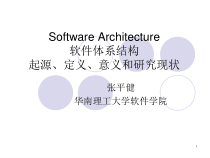 PPT
PPT
【文档说明】1-软件体系结构概念.课件.ppt,共(72)页,2.064 MB,由小橙橙上传
转载请保留链接:https://www.ichengzhen.cn/view-50406.html
以下为本文档部分文字说明:
1SoftwareArchitecture软件体系结构起源、定义、意义和研究现状张平健华南理工大学软件学院2Examplesfromarchitecture–Kennel建筑的例子——狗舍一个人搭建,需要•最小化建模•简单的过程•
简单的工具3Examplesfromarchitecture–House建筑的例子——住房一个团队高效和适时地建造,需要•仔细的建模•良好定义的过程•良好的工具4Examplesfromarchitecture–Skyscraper建筑的例子——摩天大楼5ExamplesfromO
rganization–One-manCompany机构组织的例子——家庭作坊6ExamplesfromOrganization–MiddletoSmallsizedCompany机构组织的例子——中小公司7ExamplesfromOrganiza
tion–InternationalGroup机构组织的例子——跨国集团8SoftwareDevelopment–Single-handed软件开发——单枪匹马9SoftwareDevelopment–TeamWork软件开发——团队开发10SoftwareDevelopment–Large
ComplicatedSystems软件开发——大型复杂系统的开发11SoftwareCrisis软件危机Softwaresystemsbecomeslargeraswellasmorecomplex,thereliabilityis
suebecomesmoreandmoreserious.Softwarecrisisbeginstoburst(爆发).Projectsrunover-budgetandover-time.Projectswereunm
anageableandthecodesweredifficulttomaintain.Softwareoftendidnotmeetrequirements.12EmergeofSoftwareEngineering(SE)软件工
程的诞生Theterm"softwarecrisis"wascoinedbyF.L.BaueratthefirstNATOSoftwareEngineeringConferencein1968atGarmisch,Germany.1968年在德国召
开的NATO(NorthAtlanticTreatyOrganization,北大西洋公约组织)会议上首次提出了“软件工程”概念,希望用工程化的原则和方法来克服软件危机13What’sEngineering?什么是“工
程”?EngineeringmeansSolveproblematlowestcostGuidedbyscientificknowledgeEquippedwithmethodologyReliedonsuitabletoolsPurpose:Leto
rdinarypersonbeabletodowhatcanonlybeaccomplishedbyexpertinthepast14EvolutionofEngineering工程的进化15StagesofEngineering工程化的步伐手工(Craft)商业(Commerical
)工程(ProfessionalEngineering)行家里手和业余天才熟练的工匠受过系统教育的专业人员直觉与强力既定程序分析与理论偶然的进步注重实效地优化以科学为指导地升级换代不经意的推广言传身教专业教育课程奢侈
地使用原料注重成本与原料利用原料多次利用生产是为了使用而不是出售为销售而生产市场份额16SE的发展17UnderstandingofSA软件架构认识与实践Program=Datastructure+Algorithm程序=数据结构+算法Program=Object+Object程序
=对象+对象System=Component+Component系统=构件+构件System=Element+Connector系统=组件+连接件Overallstructure>Technicaldetails整体结构>技术细节Qualities>Functionalit
ies性能>功能SOA,MDA,SaaS(Softwareasaservice)...ERP(企业级应用)、E-Business/Digital-Government(电子商务/电子政务/电子交易)、GridComputing网格、CloudComputing云计算…
18OriginofSAConceptsStudiesonSAdatedbackto1960’s,withfocusonsoftwarestructure.1969年,Brooksproposedtheconceptof―architecture‖tosepara
tedesignfromimplementation.Theterm―architecture‖wasfirstusedtomeanadescriptionofacomputersystemthatappliedequallyt
omorethanoneactualsystem19OriginofSAConcepts1968年,EdsgerDijkstraproposedtheideaoflayersForexample,programswithinOScanbeclassifiedintodifferentlaye
rs,onlyprogramsinneighboringlayerscanaccesseachother.Organizedinthisway,systemdevelopmentandmaintenancecanbesimplifiedgreatly.20Orig
inofSAConcepts1970年代初,DavidParnasproposedaseriesofimportantideas1972年,信息隐蔽(information-hiding)1974年,软件结构(softwarestructures)
1975年,程序家族(programfamilies)Aprogramfamilyisasetofprogramswhosecommonpropertiesaresoextensivethatitisadvantageoustostudythosepropertiesbefor
einvestigating(调查)individualmembers.21OriginofSAConcepts1976年,FrankDeRemerandHansKronproposedMIL75(模块
连接语言)“Programming-in-largeversusprogramming-in-small‖,[IEEETrans.onSE,June1976]22OriginofSAConceptsProgramming
intheLarge(PITL)structuringlargecollectionsofmodulestobuildsystemsdevelopingindividualmodulesMegaprogramming-Aconceptualsoftwaredev
elopmentframeworkthatunitesanumberofideascomponent-baseddevelopmentsoftwarereuseproduct-linesFormalMethod=SpecificationLanguage(规格语言)+FormalReas
oningTransformationalSystemsreduceprogramminglabor,improveprogramreliability,andupgrade(使上升)programperformance23F
ormationofSASA的形成Researchworkcarriedoutin1990’sDewaynePerryandAlexanderWolfDavidGarlanandMaryShawSAstylesDSSA1995GoFpublished―DesignPatterns‖1
994RationalRosereleasedumlsuits1995TheMythicalMan-Monthreprinted2425DefinitionsofSA―Thereisnostandard,universal
ly-accepteddefinitionoftheterm,forsoftwarearchitectureisafieldinitsinfancy(初期),althoughitsrootsrundeepinsoftwareengineering.‖http://www.sei.cmu.e
du/architecture/definitions.html26DefinitionsofSALenBass,PaulClements,RickKazman定义Thesoftwarearchitectureofaprogramor
computingsystemisthestructureorstructuresofthesystem,whichcomprise(由..组成)softwareelements,theexternallyvisiblepropertiesoft
hoseelements,andtherelationshipsamongthem.27DefinitionsofSABooch,Rumbaugh,andJacobson,1999:Anarchitectureisthesetofsignificantdecisionsabouttheorg
anizationofasoftwaresystem,theselectionofthestructuralelementsandtheirinterfacesbywhichthesystemiscomposed,togetherwiththeirbehavi
orasspecifiedinthecollaborations(合作)amongthoseelements,thecompositionofthesestructuralandbehavioralelementsintoprogressively
largersubsystems,andthearchitecturalstylethatguidesthisorganization---theseelementsandtheirinterfaces,theircol
laborations,andtheircomposition(TheUMLModelingLanguageUserGuide,Addison-Wesley,1999).28DefinitionsofSAPerrya
ndWolf,1992:Asetofarchitectural(or,ifyouwill,design)elementsthathaveaparticularform.PerryandWolfdistinguishbetweenprocessingeleme
nts,dataelements,andconnectingelements,andthistaxonomy(分类学)byandlargepersiststhroughmostotherdefinitionsandapproaches.29DefinitionsofSAGarlanandSh
aw,1993:...beyondthealgorithmsanddatastructuresofthecomputation;designingandspecifyingtheoverallsystemstructureemergesasa
newkindofproblem.Structuralissuesincludegrossorganizationandglobalcontrolstructure;protocolsforcommunication,synchronization,an
ddataaccess;assignmentoffunctionalitytodesignelements;physicaldistribution;compositionofdesignelements;scalingandp
erformance;andselectionamongdesignalternatives."30DefinitionsofSAGarlanandShaw’sdefinitioncanbesimplifiedasArchitecture=Compone
nts+Connectors+Constrains体系结构=组件+连接件+约束31EvolutionofSA(SA的发展)1980’sUseinformalBox-and-linediagrams使用非正式的框图Rel
iesonexpert’speculiarexperiences依靠专家的特定经验Adoptsporadicallyarchitecturestyles不规范、多样地使用体系结构模式和风格1990’sRealizethevalueofSA认识到了体系结构的价值R
equiredocumentingandreviewingarchitecture开发过程中要求体系结构文档,并开始体系结构评审ProductsforSAdesignandintegrationemerge产品化、商业化的体系结构标准和组件集成框架开始出现Standa
rdizevocabulary,symbolsandtoolsinSAdesign规范化体系结构设计中的词汇、符号和工具PublishbooksonSA软件体系结构的书籍和课程32CurrentStatus(1)发展现状1SAdesignisnotunderst
oodthoroughlybydevelopers体系结构设计只是被开发人员含糊地理解ItisdifficulttocarryoutconsistencyandintegrityanalysisofSAdesign难以对体系结构设计作出一致性或完整性的
分析Asitevolves,thesystemisdifficulttocomplywithoriginalarchitecture随着系统的演化,难以保持同系统原有体系结构的一致Lackeffectivetools
toassist(帮助)indesign,analysisandvalidationonarchitecture难以开发有效的工具,辅助人们进行体系结构的设计、性质分析和验证33CurrentStatus
(2)发展现状(2)DoDemphasizesSA-centeredsoftwarereuse在“软件复用的展望和策略”[DoD1992]报告中,美国国防部强调了“以体系结构为中心的复用”在整个软件生存周期中,对于软件开发和支持的重要性。Listofresearchpr
ojectsonSA:STARS,DODCARDS,DODPRISM,DODRAPIDE,StanfordUni.C2styleandADL,CaliforniaUni.ABLECMUACMEAr
chitectureInterchangeLanguage,CMUVitruvius,CMU34CurrentStatus(3)发展现状(3)ActiveresearchtopicsinSA当前软件体系结构研究和实践中,一
些最活跃的领域包括:Compilationofvariousarchitecturestyles各种体系结构风格的汇编和总结ArchitectureDescriptionLanguage体系结构描述语言FormalfoundationofSA体系结构的形式化基础Ana
lysistechniquesofSA体系结构分析技术SA-baseddevelopment基于体系结构的开发方法SAinverseengineering体系结构重建和再工程ToolsandenvironmentforSAdesign支持体系结构设计的工具和环境DSSA特定领域的软件
体系结构35FutureDirectionsFormalmethodsforarchitecturesInformationexchangeamongvariousADLsIntelligent(智能的)
designtoolsandenvironmentsSoftwarearchitectureengineeringEvolutionofarchitectures36EnvisioningSA预想软件架构SAisinfluencedbyavarietyofenvironment
alfactors商业、技术、组织等环境因素影响架构Inreturn,SAinfluencesenvironment反过来,架构影响环境37TheArchitectureBusinessCycle(ABC)AB
Ciscycleofinfluences,fromtheenvironmenttothearchitectureandbacktotheenvironment.Thebusiness/organizationalenvironmentnecessarilyaffec
tsarchitecturaldesigndecisions.Thesoftwarearchitectureinturnchangesthebusinessenvironment.Architecturaldesignispartofe
verystepofthedevelopmentprocess.Theseinfluencesstronglyaffecttheorganization’sbottomline.38TheEnvironme
ntInfluencesDesignsStakeholdersinasoftwaredevelopmenteffortEndusersCustomersDevelopersProjectmanagerMaintainersMarketingstaff…Ever
ystakeholderhasadifferentsetofconcerns,e.g.,runtimebehavior,hardwarecompatibility(兼容性),andsoon.Thedifferentstakeholders’con
cernsmaycontradict(反驳)eachotherandmaychangeduringtheproject.3940AttributesImportanttoDifferentStakeholde
rsPerformanceandresourceutilizationCulturaladaptibilityReliabilityanddataintegrityModifiabilityandmaintainabi
lityUsabilityandinteroperabilityTestabilityPlatformcompatibilityAvailabilitySecurityBehavior…41BusinessEnvironmentan
dOrganizationalStructureImmediatebusiness(短期)influencesareexistingassetslikearchitecturesandproductsbasedonthemthatinfluencedesigndecisions.Lo
ng-termbusiness(长期的)influencesarestrategicgoalsfortheorganization,suchasinfrastructure(基础设施)development,thatinfluencedesigndecisio
ns.Organizationstructureinfluencesarchitecturewhennecessaryspecializedexpertiseexistsordoesnotexistwithintheorganizatio
n.42TheArchitect’sBackgroundandExperienceSuccessfulpreviousexperiencesmakearchitectswanttoreusethesuccessfulstrategyNegativeprevious
experiencesmakearchitectswanttoavoidusinganapproachagainPriorexposure(暴露)topreviousarchitecturalpatternsorothereducationcaninfluenceth
earchitectStandardindustrypracticesinthearchitect’sprofessionalcommunity,e.g.,Web-based,object-oriented,middleware-backedinformatio
nsystemdesigns,willplayastrongrole43Influencesonthearchitecture44TheArchitectureBusinessCycle45ArchitectureDesignChangetheBusi
nessEnvironmentTheyaffectthestructureoftheorganization.Theyaffectthebusinessgoalsoftheorganization.Theya
ffectcustomerrequirementsfornewproducts.Theyaffecthowfuturearchitecturesaredesigned.46ArchitectureDesignChangetheBusines
sEnvironmentSoftwarearchitecturesaffectthestructureofsoftwaredevelopmentorganizations.Anarchitectur
eprescribes(规定)thesoftwareunitstobedeveloped.Thesoftwareteamnormallyorganizesaccordingtothesoftwareunits.Teamstend
tospecializeandbecomeembedded(嵌入式的)intheorganizationalstructure.47ArchitectureDesignChangetheBusinessE
nvironmentSoftwarearchitectureseventuallyaffectthegoalsofasoftwaredevelopmentorganization.Aninitialentryintosomemarketisafo
otholdthatwillleadtonewopportunities.Anorganizationwillchooseopportunitiesthatbestcapitalize(使资本化)onexisting,provenarchitectures.48ArchitectureDesig
nChangetheBusinessEnvironmentSoftwarearchitecturesalsoaffectcustomerrequirementsfornewproducts.Anexistin
gproduct’sarchitecturecanserveasthefoundationforaproductline.Customersrecognizethepotentialforloweredcostsandfastertimetomarketthroughreuseofanexi
stingarchitecture.Customersmaybewillingtorelaxfunctionalrequirementsinordertoachievethesebenefits.49SAAffectstheDevelopmentProcess
Softwarearchitectureisanimportantcomponentofthelargeroverallsoftwaredevelopmentprocess.Creatingthebusinesscas
eUnderstandingrequirementsCreatingorselectingthearchitectureCommunicatingthearchitectureAnalyzingorevaluat
ingthearchitectureImplementingbasedonthearchitectureEnsuringconformancetothearchitecture50SAAffectstheDevelopmentPro
cessArchitecturalknowledgeisessentialforunderstandingtheconstraints(约束)andassumptions(假设)involvedinmakingabusinesscaseforap
roduct:CostCustomermarketTargetedtimetomarketInterfacestoothersystemsLimitations51SAAffectstheDevelopmentProcess
RequirementsengineeringUsecases/ScenariosRapidprototyping(样机研究)FinitestatemachinemodelsFormalspecificationsNormally,
determiningacompletesetofrequirementswillneedatleastareferencearchitecture,soaniterativerequirementsengineeringprocessisalmostalwaysnecessary
52SAAffectstheDevelopmentProcessArchitecturalanalysistechniqueshelpsoftwareteamsevaluateanarchitectureAr
chitectstypicallyconsidermultiplecompetingdesigns.Inattribute-drivendesign,candidatearchitecturesareevaluatedaccordingtotheirabilitytosupportdes
iredqualityattributes.OnemethodforcomparingarchitecturesistheArchitectureTradeoffAnalysisMethod(ATAM)fromtheCMUSoft
wareEngineeringInstitute.53SAAffectstheDevelopmentProcessSoftwarearchitectsneedtoensurethattheimplementationremainsfaithfultothearchitecturald
esign.Thearchitecturaldesignneedstobecommunicatedeffectivelytothedevelopers.Architectsneedtomonitorthedevelopmentprocess.Ifpossib
le,thedevelopmentinfrastructureshouldenforceconformancetothearchitecturespecifications.Asthearchitecturematuresandevolves,itmus
tbekeptsynchronizedwiththedesigndocumentation.Inthecasethatproperdesigndocumentationdoesnotexist,softwarearchitecturereconstru
ctiontoolsmaybeuseful.54SAAffecttheBottomLineAnarchitect’sdesigndecisionshavelong-termfinancialconsequencesforasoftwaredevelopmentorgani
zation.Thearchitecturehasapivotalroleinthesoftwaredevelopmentprocess.Ithasabigimpactonasystem’sabilitytomeetqualitygoals.Itsupports(ordoesn’ts
upport)reuseatmultiplelevels.55SAAffecttheBottomLineThearchitectureiscommonabstractionthatallstakeholderscan
useformutualunderstanding.We’vealreadyseen,architecturaldesigndecisionshaverepercussionsthroughoutthedevelopmentcycle.Changingthearchitec
tureduringthedesignphaseiseasy;it’smuchharderlater.Thearchitectureseverelyconstrainsthedetailedsoftwaredesign.Thearchitectureprofoundlyaffectsthep
lanning,schedule,andbudgetfortheentireproject.56SAAffecttheBottomLineHavingtherightarchitectureiscrucialformeetingqualitygoals.Performancemig
htdependonthevolumeofinter-elementcommunication.Modifiabilityrequiresseparationofconcernsinthearchitectur
e.Securityrequiresarchitecturalelementsforaccesscontrol.Scalabilityrequiresarchitecturalbreakdownwherecertainelementscanbereplicated
orreplacedwithhigher-performanceversions.Reusabilityrequirescomponentswithouttoomanyattachmentstothesurroundingenvironment57WhyIsArchi
tectureSoImportant?CommunicationamongstakeholdersCapturesearlydesigndecisionsTransferableabstractionofth
esystem58Architecture&DesignDecisionsDefinesconstraintsonimplementationRelatedtoorganizationalstructureEnablesQ
ualityattributes(e.g.,performance,safety,security)AllowssystemspropertiestobepredictedHelpsevolutionaryprototypingHelpsreasonab
outchangeCostandschedulingestimates59ATransferable,ReusableModelSoftwareproductlinesshareacommonarchit
ectureBuildusinglarge,externallydevelopedpiecesRestrictvocabularyofdesignchoicestominimizedesigncomplexityPerm
itstemplate-baseddevelopment60ResponsibilitiesofArchitectsGuidethetechnicaldirectionsManageconflictinginf
luencesMinimizeunforeseendifficulties61GuidethetechnicaldirectionsConvertcustomerrequirementsintoatechnicaldesignEnsurethatthetechnicaldesignm
eetsqualityrequirementsCommunicatewithstakeholdersthroughdetailedtechnicalpresentationsListentostakeh
oldersandbuildconsensusReviewdevelopercodeandensureconformancetothearchitectureandgoodcodingpracticesServeasamentorfordevelopers62ManageC
onflictingInfluencesThearchitectmustidentifythestakeholders.Thearchitectmustengagethestakeholderstosolicittheirneedsandexpec
tations.Thearchitectshouldusearchitecturereviewsanditerativeprototypingasmeanstosolicittheseneedsandexpectations.6364TypicalDes
ignTrade-offsFunctionalityvs.UsabilityPerformancevs.ModifiabilityCostvs.RobustnessEfficiencyvs.Port
abilityRapiddevelopmentvs.FunctionalityCostvs.ReusabilityBackwardCompatibilityvs.Readability65MinimizeUnforeseenDifficul
tiesCasestudiesofsuccessfularchitecturesgivecluesaboutthebestapproachtoanewproblemandarerichsourcesofdesignpatterns.Architecturalassessm
ent(beforethesystemisbuilt)helpsdeterminewhichcompetingdesignalternativesarebetter.Incrementalarchitecture-bas
eddevelopmenthelpstouncoverdesignflawsbeforetheykillaproject.66AsuccessfulsoftwarearchitectshouldBeanexcellentprog
rammerwithsignificantdesignandimplementationexperience.Stayup-to-datewithnewtoolsandtechnologies,andknowrelevantdesignp
atternsandanti-patterns.Beagoodpolitician,negotiator,andcommunicatorwhocanspeakthelanguagesofthebusinessteamandthetechnicalteam.-Youtypicallyneedse
veralyearsofprofessionalexperiencetobealeadsoftwarearchitectinamaturesoftwaredevelopmentorganization.67ChiefArchitectBillGatesa
ctedasthechiefarchitectofMicrosoft.丁磊68BestPracticesinSADesignThearchitectureshouldbetheproductofonearchitect(orafewarc
hitectswithadefinedleader).Thearchitectshouldbegivenfunctionalrequirementsandaprioritizedlistofnon-funct
ionalrequirementsorqualityattributes(security,modifiability,andsoon)thatneedtobesatisfied.Thearchitectureshouldbedocumentedfrommultip
leperspectiveswellenoughtofacilitatecommunicationandunderstandingbetweenallstakeholders.Thearchitectureshouldbecircul
atedtothesystem’sstakeholdersandtheyshouldparticipateactivelyinanarchitecturereview.69BestPracticesinSADesignThearchitectureshouldbeanalyzedf
orquantitativemeasureslikemaximumthroughputandformallyevaluatedforqualityattributesbeforeitistoolatetochangethea
rchitecture.Itshouldbepossibletoimplementa―skeletal‖versionofthearchitecturewherecommunicationisexercisedbutfunctiona
lityisminimal.Thisallowsforincrementalgrowth.Resourcecontentionareasshouldbeidentifiedandresolved,andthesolutionshouldbesp
ecified,circulated,andmaintained.70RecommendationsforStructuringSoftwareThearchitectureshouldbecomposedofwell-definedmodulesthatutilizetheprinciples
ofinformationhiding(encapsulation)andseparationofconcerns.Themodulesshouldhideanyidiosyncrasiesoftheexistingcomputinginfrastructure.Eachmo
duleshouldhaveawell-definedinterfaceencapsulatingorhidingimplementationstrategiesanddatastructures.
Qualityattributesshouldbeachievedusingwell-knownarchitecturalpatternswiththeirassociatedtactics.71RecommendationsforStruc
turingSoftwareThearchitectureshouldnotdependonfunctionalityofaspecificversionofacommercialproductortool.Ifcomme
rcialtoolsareunavoidable,thearchitecturemustbestructuredsothatchangingthetoolhasminimalimpactontherestofthesystem.
Modulesproducingdatashouldbeseparatefrommodulesthatconsumedata.Thisimprovesmodifiabilitywhenchangesareconfi
nedtotheproducerorconsumer.Forparallelarchitectures,thethreadsshouldbecarefullyspecifiedseparatelyfromthemodules,sinceaprocessmightexecuteinmor
ethanonemodule.72RecommendationsforStructuringSoftwareThreadsshouldbewrittensotheycaneasilymigratefromoneprocessortoanother.Thecompleteset
ofinteractionpatternsshouldbesmall,simple,andwell-defined.Theresultingconceptualintegrityinthearchitecturewi
llleadtosmoothdevelopment..
 辽公网安备 21102102000191号
辽公网安备 21102102000191号
 营业执照
营业执照